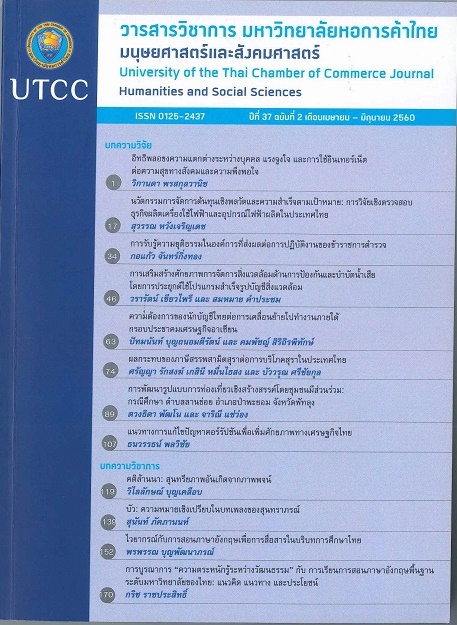Effects of Alcohol Excise Tax on Alcohol Consumption in Thailand
Main Article Content
Abstract
Thailand is the one of the highest alcohol consuming country. This leads to the country’s
negative social and economic effects. Therefore, the Thai government pays attention to reducing
the negative effects by collecting alcohol excise taxes. As higher alcohol excise taxes lead to
higher prices of alcohol drink, alcohol consumption is likely to decrease. The purpose of this
paper is to investigate the effects of alcohol excise taxes on the levels of alcohol consumption in
Thailand. The research is conducted by using secondary quarterly data from 1997Q1 to 2013Q4.
There are four alcohol beverages included in this paper: white spirit, blend spirit, special blend
spirit, and special spirit. Co-integration method is applied to investigate long run effects of alcohol
taxes on the levels of alcohol consumption in Thailand while the short run effects of alcohol taxes
on the levels of alcohol consumption in Thailand is tested by using Vector Error Correction Model.
The results indicate that alcohol excise taxes have negative effects on the levels of consumption
of blend spirit, special blend spirit, and special spirit in Thailand. However, the alcohol excise tax
has no significant effect on white spirit, both in the short run and long run
Article Details
ลิขสิทธิ์ของบทความ
ผลงานที่ได้รับการตีพิมพ์ถือเป็นลิขสิทธิ์ของมหาวิทยาลัยหอการค้าไทย ห้ามมิให้นำเนื้อหา ทัศนะ หรือข้อคิดเห็นใด ๆ ของผลงานไปทำซ้ำ ดัดแปลง หรือเผยแพร่ ไม่ว่าทั้งหมดหรือบางส่วนโดยไม่ได้รับอนุญาตเป็นลายลักษณ์อักษรจากมหาวิทยาลัยหอการค้าไทยก่อน
References
chaloupka, F. J.,Saffer, H.,&Grossman, M.(1993).Alcohol Control policies and motor vehicle fatalities. Journal of Legal Studies,22(1),161-186.
Chiyupathum, T.(2013).Alcohol cigarette tax and economy. Retrieved March 2,2016 from
https://www.cdd.go.th/cddwarehouse/pdf/ana_04.pdf (in Thai)
Dickey,D.A.,&Fuller,W.A. (1979). Distribution of the estimator for autoregressive time series. Journal of the American Statistical Association, 74, 427-431.
Elder,R,W.,Lawrence,B., Ferguson,A., Naimi, T. S., Brewer, R. D., Chattopadhyay, S, K.,.., Fielding, J. E. (2010) The effectiveness of tax policy interventions for reducing excessive alcohol consumption and related harms. American Journal of Preventive Medicine, 38(2).217-229.
Engle, R. F., & Granger, C.W. J. (1987). Cointegration and error correction: Repressntion, estumation and testing. Econometrica, 55 (2), 251-276.
Johansen, S., & Juselius, K.( 1990). Maximum likelihood estimation and inference on co-integration with application to the demand for money. Oxford Bulletin of Economics Statistic, 52(2) ,169-210.
Prusapinyo, C. (2008). Health consumer protection: Policy law and enforcement. Bangkok, Thailand:Chareunmankong. (in Thai).
Pukahuta P . (2015) The factors affecting demand for alcoholic beverage in Thailand. University of the Thai Chamber of Commerce Journal, 35 (1) ,101-111.( in Thai)
Ruhm, C.(1996). Alcohol policies and and highway vehicle facilities. Journal of Health Economics, 15(4) ,435-454.
Thai. Nationnal Statistical Office. (2012). The 2012 cigarette smoking and alcohol drinking survey. Bangkok, Thailand: Author. ( in Thai)
Wang,K. H., & Ke .J .C. (2002) Control policy of an M/G/1 queuing system with removable and non-reliable server. International Transactions in Operational Research, 9(2), 195 -212.
Wisarutwong , C. (2001). The comparative study on alcohol excise tax: Case study of Singapore, Philippine, Korea, Australia, and EU. Bangkok, Thailand: Health Promotion Foundation of Thailand. (in Thai)


